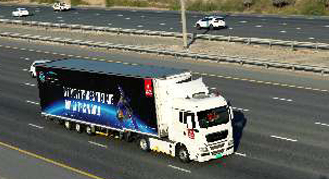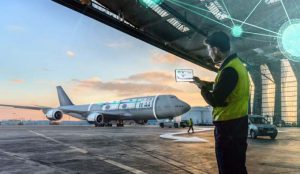How the digital economy is reshaping the air cargo industry
The air cargo industry, which accounts for about a third of global trade transported annually valued at over US$6 trillion, continues to struggle to fully embrace digitalization but major companies in different continents have long initiated steps to transition their operations from traditional way to digital, eliminating in the process much of the paperwork.
New technologies are redefining the way we live, work Nand how business is done. The transformation has been rapid in recent years with varying industries, including air freight, forced to adopt to digitalization by reshaping their business and operating models or be left out in a highly competitive digital world.
The digital transformation’s impact on air cargo industry is noticeable. Less paper work. Fast transaction. Transparent tracking system and so on. Undoubtedly, it has immense potential to create added value for businesses, benefit consumers and communities in general even in remotest parts of the planet.
According to World Economic Forum’s Digital Transformation Initiative (DTI), companies are investing in new technologies mainly to accelerate growth and productivity. Their total investment spend is projected to increase to US$2.4 trillion in 2020, focused on seven key technologies—Artificial Intelligence (AI), Internet of Things (IoT) and connected devices, Robots & Drones, Custom Manufacturing and 3D Printing, Autonomous Vehicles, Big Data Analytics & Clouds and Social Media & Platforms.
This year, more companies are seen to change their business models to adopt to the changing times, noticeably the air transport sector.
The air cargo industry, which accounts for about a third of global trade transported annually valued at over US$6 trillion, continues to struggle to fully embrace digitalization but major companies in different continents have long initiated steps to transition their operations from traditional way to digital, eliminating in the process much of the paperwork.
Any digitalization project costs a fortune to initiate and maintain. The disruption entails creating specific systems tailored for that particular company’s needs and nature of business, having the new digital systems tested by a certified software testing firm, embedding it with adequate protection against malware and invasions, training employees to efficiently use the new systems, among other things.
Unless the digital systems (software) are licensed perpetually, digitalization means costs for upgrades and continued use. Utilizing new technologies is a tedious process that requires resources, skills and knowledge but companies are convinced this is an efficient way to do business in today’s digital world and the future.
The rise of e-booking platforms
Germany’s national cargo carrier, Lufthansa Cargo, considered a leader in eAWB (electronic AirWay Bill) and electronic bookings, launched in November of 2019 its smartBooking, a new digital interface (application programming interface or API), providing customers and partners a binding offer that can be booked online immediately.
“It contains the available routings, capacities and prices and automatically executes all relevant checks. This means that the offer can be booked in real time and confirmed straightaway. With smartBooking, Lufthansa Cargo has completely digitalized the offer and booking process,” explained Jacqueline Casini, Senior Director Communications, Marketing & Corporate Responsibility at Lufthansa Cargo.
Moving forward, Lufthansa mulls offering air freight forwarders the option of directly connecting their own systems via an API.
This year, more companies are seen to change their business models to adopt to the changing times, noticeably the air transport sector.
B2B transactions are increasingly being driven by technologies to create convenient and fast services and Lufthansa is highly cognizant of this.
The TIACA Chairman said digitalization will continue to be on top of their agenda for many months.
As the freight division of Emirates, Emirates SkyCargo has access to the airline’s fleet of over 265 modern wide-body aircraft. The carrier operates to 13 destinations in the US, offering cargo capacity on over 100 weekly flights including scheduled freighter services to destinations including Columbus, Chicago, Houston and New York.
“Perspectively, external sales platforms will also be successively connected,” Casini told Air Cargo Update noting that, “Aside from Lufthansa Cargo’s direct customers, partners such as significantly growing cargo.one can also use the smartBooking API to make their platforms even more informative and customer-oriented with immediate access to available capacities and prices.”
B2B transactions are increasingly being driven by technologies to create convenient and fast services and Lufthansa is highly cognizant of this.
“B2B transactions are increasingly driven by customer experience and customer experience is driven by the experience of consumers in a digital world, convenient and fast services
supported by technology. This experience is a driver for change in the B2B world where customers increasingly demand the same as a consumer, e.g. instant information on shipment status, real time prices, instant confirmation of bookings, paperless transactions, provision of data, integration of services in apps, convenient and fast user interfaces, connectivity. All of that is driven by technology,” said Casini.
In December of 2019, Lu hansa Cargo began using Rapid Rate Response on all of its own booking channels generating spot price offers for all customers based in the following pilot markets: Thailand, Vietnam, North and Northeast India, Beijing, Middle East, Iran, Turkey, USA (California, Nevada, Arizona, Hawaii, New York, Connecticut, New Jersey, Massachusetts, Maine, New Hampshire, Vermont, Rhode Island, Washington, Oregon, Idaho, Alaska), Mexico, Spain, Portugal, Cologne and Stuttgart. It plans to extend the system worldwide by the end of 2020.
Digitalization has also paved the way for startups like cargo.one, a multi-booking airline e-booking platform which counts as among its clients Etihad Cargo, Lufthansa Cargo, All Nippon Airways (ANA), AirBridge Cargo, AirCargo Logic, etc.
“cargo.one gives forwarders the ability to search, compare and book air cargo capacity across multiple airlines with live spot rates in less than 2 minutes,” the company pointed out on its website.
The powerful global trade body, The International Air Cargo Association (TIACA), says pushing for more digitalization in the air cargo industry remains a top agenda.
Steven Polmans, TIACA Chairman, said many of their members are well aware of digitalization’s importance and had since taken the initiative to introduce newer technologies in their operations. But he agreed much needs to be done.
“Digital is everywhere today. The world is becoming more and more digital and so is the air cargo industry. So, obviously, digital is no longer an option for air cargo stakeholders and most of them have already understood the fact, if we take a look at what has been already developed within the industry. Many initiatives have already been implemented and are something particularly appreciated by TIACA since it contributes to air cargo development,” Polmans said.
“But the form that digitalization takes within the individual companies is a strategic choice for each of them, whether it concerns e-booking platforms, or any other digital tools aimed at improving efficiency, for instance. TIACA’s role is to promote the best practices or best initiatives in this area but in no way to offer strategic guidance on it,” he added.
The TIACA Chairman said digitalization will continue to be on top of their agenda for many months and years to come and vowed to support existing programs or initiatives harnessing the benefits of digital innovation in the industry.
“TIACA will also continue to motivate change to a digital environment, organizing both digital workshop and training events, and giving digital a prominent place in our summit meetings, for instance during the next Air Cargo Forum which will be held in Miami in November,” he said.
The global trade association representing 290 airlines in 117 countries, the International Air Transport Association (IATA), is also pushing for an end-to-end paperless transportation for air cargo through regulatory framework, modern electronic messages and high data quality.
On January 1, 2019, IATA successfully adopted an industry-wide policy that e-AWB is the new default contract of carriage for all air cargo shipments on enabled trade lanes. It took nine years to implement it after the policy was first introduced in 2010 but IATA said it’s a major milestone for their quest to digitalize the air cargo industry.
e-AWB essentially eliminates paper-based processes, improved efficiency and reliability of overall cargo handling process by decreasing handling errors.
 Adrien Thominet, ECS Group CEO
Adrien Thominet, ECS Group CEO
“The major orientations that we will develop in 2020 are in the continuation of the transformation efforts undertaken this year. In terms of digit alization, we are working on new solutions that will reduce the process costs of the airlines we represent. These solutions already exist within the frame work of TCM contracts (messaging solutions, fuel cost management, etc.)”
Innovative Solution
In the Middle East, Emirates SkyCargo launched in October 2019 Emirates Delivers, a new e-commerce delivery platform allowing customers to shop from multiple online retailers in the US and have it consolidated for shipment to the UAE, saving them money and time.
 Designed for individuals and small businesses in the UAE, Emirates Delivers is a fast, reliable and cost-effective e-commerce shipping solution that can also be used by other e-commerce businesses and logistics integrators.
Designed for individuals and small businesses in the UAE, Emirates Delivers is a fast, reliable and cost-effective e-commerce shipping solution that can also be used by other e-commerce businesses and logistics integrators.
Emirates says customers have to go through a free registration process at www.emiratesdelivers.com. On completion of registration, members are allocated a unique and free Emirates Delivers mailing address in the USA. Customers can have their online purchases from US e-commerce retailers delivered to this address where the goods can be stored free of charge for up to 30 days.
Customers have the flexibility to create a shipping request anytime within these 30 days and have their purchases consolidated into one parcel and have this delivered to their designated UAE address. The packages will be transported to Dubai on Emirates SkyCargo’s flights from the US and will then be delivered to the shopper’s doorstep within 3-5 days of the creation of the shipping request.
As the freight division of Emirates, Emirates SkyCargo has access to the airline’s fleet of over 265 modern wide-body aircraft including 12 freighters- 11 Boeing 777-Fs and one B747F. The carrier operates to 13 destinations in the US, offering cargo capacity on over 100 weekly flights including scheduled freighter services to destinations including Columbus, Chicago, Houston and New York.
Tech investments
ECS Group, a global leader in the GSA industry, dealing with dozens of airlines around the world said digitalization makes things faster, transparent and more efficient.
The Group, the largest integrated GSSA worldwide with more than 69 subsidiaries and 137 offices spanning across 47 countries, said it will continue investing on technologies.
“The major orientations that we will develop in 2020 are in the continuation of the transformation efforts undertaken this year. In terms of digitalization, we are working on new solutions that will reduce the process costs of the airlines we represent. These solutions already exist within the framework of TCM contracts (messaging solutions, fuel cost management, etc.),” shared Adrien Thominet, ECS Group CEO.
“In addition, we are also working on the design of webportal solutions for e-booking as well as e-quotes solutions, always with the aim of simplifying and facilitating the exchange of information in order to improve efficiency and performance,” he added.
Last year, the Group intensified its digital transformation through introduction of various innovative systems.
“In 2019, we have intensified the digital transformation of our group to serve the business, in order to strengthen the level of services offered to our customers and to improve performance,” shared Thominet. “First of all, Apollo (our business intelligence tool), which provides us with real-time data analysis and visualization on our markets. This data allows us to perform highly professional and personalized sales planning, sales steering, performance management and income optimization.”
“Our teams have also created Pathfinder, an internal Track & Trace system developed for the airlines we represent under a TCM contract. This provides our clients with a real-time view of their shipment status via a user interface, which is also available on mobile phones and allows them to sign up to receive email notifications. This application also provides a real-time map view of the position of the aircraft containing the cargo,” he noted.



